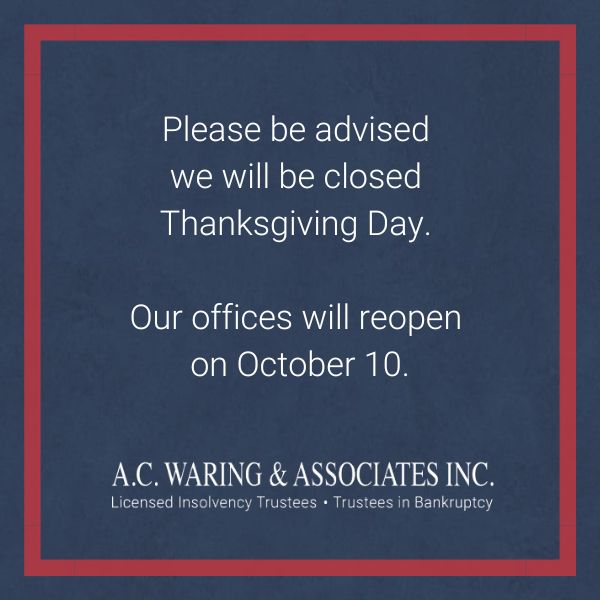If you’re in need of cash fast, you may take out a payday loan. These high interest, short-term loans could help address emergency costs like property damage, but they are hardly ever worth taking out unless you are absolutely certain you can pay them off by their first due date.
But life happens, and you may find yourself in a position where you cannot pay back your payday loan or other unsecured debts you may have. In this case, you may need to start looking for debt solutions. But can filing bankruptcy discharge your payday loan debt?
Today, we’re going to explore what payday loans are, how they differ from other types of loans, and if payday loans are included in the bankruptcy process. If you’re unsure how you can take control of your finances, please speak to a Trustee at A.C. Waring & Associates today.
What Are Payday Loans?
If you’re in a situation where you need a certain amount of money quickly, you may take out a payday loan. These short-term loans, provided by private lenders, have high interest rates and fees that make them much more expensive than the original loan you take out.
In Alberta, you may borrow up to $1,500 with up to 62 days to pay it back. However, if you miss your first due date, you may be charged extra fees and penalties. Many people find themselves taking out another payday loan to cover the first, locking them in a payday loan cycle that can be incredibly hard to get out of.
Payday loans, however, are considered an unsecured debt. If you need to file for bankruptcy, then payday loans are among the various types of debts you may be discharged after the bankruptcy process.
Unsecured vs. Secured Debts
There are 2 different types of debt you can accumulate: secured debt and unsecured debt.
These debts are unique from each other and may come with different responsibilities, so it’s important to understand the difference between the two before you take one out in the form of a loan.
Unsecured Debts
Unsecured debts are any type of debt that does not need collateral to guarantee the loan to the lender. Bankruptcy can discharge your from several types of unsecured debts, including:
- Credit card balances
- Unpaid utility bills
- Retail accounts
- Payday loans
Unfortunately, bankruptcy does not discharge you from all types of debts. You may still be responsible for:
- Student loans
- Child support
- Court-ordered fines and debts

Secured Debts
Secured debts are guaranteed to your lender by some sort of collateral, meaning that you’ve promised something to them if you cannot pay back your loan. Some of the most common secured debts include:
- Mortgages
- Car loans
- Government debt and taxes
Some of the collateral you may be able to use for your loan can include:
- Land
- Personal assets
- Stocks and bonds
Typically speaking, lenders are more likely to agree to these types of loans because there is something that protects them from losses. On top of this, lenders may also agree to lower interest rates and fees, which can help make it easier for you to pay back your loan in the long run.
The Bankruptcy Process
Now that we know that payday loans are included in bankruptcies, let’s take a look at what the process looks like and what you’ll need to know if you plan on filing for bankruptcy.
For starters, to file for bankruptcy in Canada, you’ll need to meet these certain requirements:
- You must reside, own land, or own a business in Canada
- Be insolvent for up $1000 or more
- The value of your debts is more than the value of your assets
- You are unable to pay your debts by their due dates
If you meet the criteria, you may be eligible for bankruptcy.
Types of Bankruptcy
There are a few different types of bankruptcy you might experience, including:
- Voluntary assignment: This is when you volunteer your assets for the benefit of your creditors.
- Involuntary assignment: This happens when a creditor files a petition of bankruptcy against you to reclaim losses.
- Deemed bankruptcy: This can happen when you start the bankruptcy process but fail to meet certain requirements either laid out by the Bankruptcy & Insolvency Act or by your creditors after they accept your plan.
Choose Your Licensed Insolvency Trustee
Now that we know what type of bankruptcies there are, the next step in the process is to find a Licensed Insolvency Trustee (LIT). A LIT is going to be the person responsible for helping you make your bankruptcy proposal, which they will then file on your behalf.
Once your LIT files your bankruptcy, you’ll officially be declared bankrupt. From this point forward, you’ll enter a Stay of Proceedings, and your LIT will work with your creditors on your behalf. Your LIT will also sell certain assets to help pay back your creditors.
Stay of Proceedings
A Stay of Proceedings is a 9 to 21 month period where your creditors:
- Will not be able to contact you for payments.
- Will not be able to garnish your wages.
- Will not be able to sue you or continue suing you.
During this time, you’ll also be required to attend two financial counselling sessions. It’s also possible that you may need to make surplus payments of $200 a month to your creditors during this time, but this ultimately depends on how much money you make after making the income you need to support yourself and your family.
After this period, you’ll be discharged of your unsecured debts, but a notice of bankruptcy will remain on your credit report for up to 6 years.
Know Your Options & Get Help Today
If you’re struggling with payday loans or have found yourself in the payday loan cycle, we’re here to help. Find out how the Licensed Insolvency Trustees at A.C. Waring & Associates can help break the cycle of debt today and give us a call.





